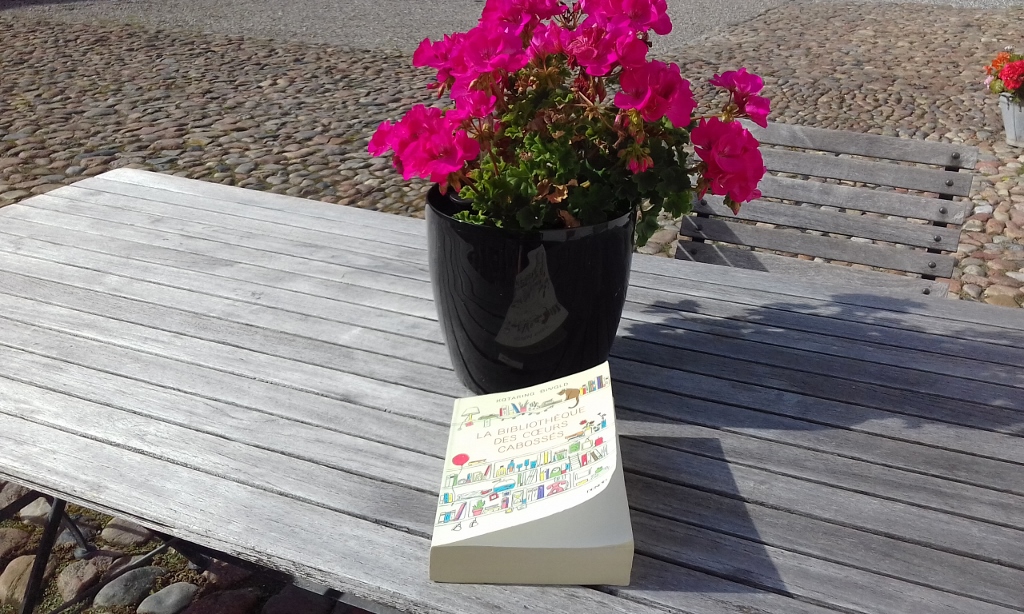A few days ago I asked for book recommendations in exchange for a signed copy of my book in any language I have at home. Over the following weeks I plan to publish some of the beutiful emails I got in response to it. All the emails are published with the sender’s permission.
Imane first wrote to me to tell me about how she found my book, thanks to a bee, a broken down bicycle and a B&B in Nyborg, Denmark. Later, she wrote to introduce me to the universe of Amin Maalouf:
From Denmark to Sweden… and Morrocco
“Saturday, September 17th, 2016:
Dear Katarina,
My name is Imane, I am 36 years old. I’m Moroccan (and became French 10 years ago after 7 years living in France). I am writing to you from Odense in Denmark, a very nice city in the Funnen Island (West-South of Denmark). I am travelling around in Denmark and I’ll come back tomorrow to Casablanca (in Morocco).
Prior to my arrival to Odense, I was enjoying a 3 days-staying in a very nice and isolated B&B in the countryside of the city of Nyborg. I had 4 books (2 novels – one from Latin-America and the other from Europe, 1 academic book on neurolinguistic programmation and 1 essay on the Danish happiness). I was happy just running between the corn fields, reading under old trees, walking in the humid grass, witnessing huge rabbits and smelling this unique essence of the symbiosis between Nature and Human being.
The day before my departure to Odense (Thursday), I wanted to spend the day in Nyborg. I found a bike in the garage to go to town (30 minutes biking)… but the bike didn’t work. I then decided to go walking (1 hour walking)… but I got bitten by a bee right beneath my left foot and could not make it. I was a bit pissed of, but not too long thanks to a warm cup of rooibos tea I prepared in the kitchen. While contemplating the ways I could schedule back my last day, my eyes (or my soul) got attracted by the shelves behind, where there were few books. Between “The tales of Amsterdam” and the “Copenhagen city guide”, I found the only one written in French: “La bibliothèque des coeurs cabossés” (Broken Wheel).
I started it at 11.30am… and could not get off my eyes until the next day (with some sleeping hours though, as I had to be well up for the next travelling day). I finished it at 11.30am the next day (right before my departure scheduled at 12.00am… I was actually begging a nice lady who offered me a drive to Odense to wait until I finish it). I left a short note on it, for the next lucky reader of the B&B. I put it back on the shelves and I promised to myself to order it on Amazon so as to have my own hard copy.
I did want to write to you and express my gratitude for the joyful and oniric moment I spent on Thursday and Friday morning reading your novel (and I should thank also the Bee and the Broken bike, otherwise I would have missed “our moment”!). I wish one day I could give the same joy, plenitude and nourishing moment to a person who may read my words and fall in love with my stories. Maybe, one day, I could open my own library in some “Broken Wheel” city in some part of Morocco.”
(Thursday, September 22, 2016)
“Dear Katarina,
What a good idea you had! I would love to receive a signed copy of your book (in French language, as I already bought the e-book in English… I did not find the French copy in my Kobo library).
Not that easy to spontaneously recommend a book, as I assume you may have read a bunch of them, making the probability to choose one you have not read very thin… adding in the equation that you would like it, that makes it harder :) BUT I take the challenge, as you have asked us to recommend a book WE do love!
When I was in my early 20’s years old, I remember falling in love with the universe of Amin Maalouf’s books (Samarkand, Leo Africanus, the Gardens of light, the rock of Tanios, etc.). Samarkand is one of my favourite (nourrished with the poetry of Omar Khayyam, “The Rubbayat”).
Sincerely,
Imane”
I still have copies left, so don’t hesitate to send me your book recommendation. Read more about it here
